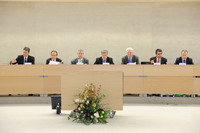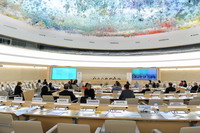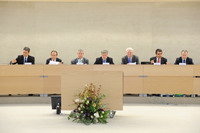Telefónica Public Policy & Telefónica España Regulatory teams
 On 28 September, during an event organized in Geneva (Switzerland) by the Onuart Foundation and the United Nations Spanish Global Compact Network, Telefónica and two other Spanish companies presented their corporate responsibility policies and good practices involving the management of human rights at the United Nations. The purpose of this event, entitled “Businesses and Human Rights”, was to demonstrate the policies promoting human rights in the private sector.
On 28 September, during an event organized in Geneva (Switzerland) by the Onuart Foundation and the United Nations Spanish Global Compact Network, Telefónica and two other Spanish companies presented their corporate responsibility policies and good practices involving the management of human rights at the United Nations. The purpose of this event, entitled “Businesses and Human Rights”, was to demonstrate the policies promoting human rights in the private sector.
Telefónica explained the context in which the company develops its policies in favour of human rights. This refers to both general (employment, manufacturing or supply chain, community and environment) as well as specific aspects of the sector in which it operates: privacy, human rights abuses over the Internet, the use of ICTs beyond the company’s control, the more rapid development of technology in relation to legislation, possible conflicts between the local legal framework and internationally recognized human rights as well as jurisdictional complexity (global Internet actions vs. national companies and governments). In his presentation, Alberto Andreu Pinillos, Chief Reputation and Sustainability Officer at Telefónica, explained the company’s fundamentals of sustainability (Honesty and Trust, Integrity, Human Rights and Respect for the Law) as well as the international bodies to which it is a member: ILO and Global Compact amongst others.
The Global Compact is an international initiative created back in 2000 by Kofi Annan, former UN Secretary General.  It promotes corporate social responsibility through 10 universal principles that the entities which adhere to the Global Compact agree to comply with and which cover four working areas: human rights, labour standards, the environment and combating corruption.
It promotes corporate social responsibility through 10 universal principles that the entities which adhere to the Global Compact agree to comply with and which cover four working areas: human rights, labour standards, the environment and combating corruption.
The Global Compact was created in order to reconcile the activity and needs of businesses with the principles and objectives of the United Nations’ policy and institutional action plan, labour organizations and civil society itself.
Furthermore, and as we have mentioned in our blog, Telefónica is one of the 54 multinationals that the United Nations has selected in January 2011 to constitute the Global Compact LEAD, a leadership platform for the promotion of sustainability in the world. These companies have been recognised as sustainable leaders in the global economy.
Sources:
– El Economista (Servimedia)
– Red Pacto Mundial España










